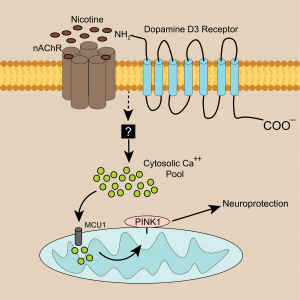Newly published research from the lab of Drs. Guy and Kim Caldwell (a.k.a., The Worm Shack) suggests an answer to a long-standing medical mystery: specifically, why it is that tobacco smoking, a well known risk factor for a variety of diseases, actually protects individuals from Parkinson’s Disease? This research, led by UA Biological Sciences Ph.D. candidate, Brucker Nourse, and performed in collaboration with Israeli neurogeneticist, Dr. Millet Treinin, of Hebrew University in Jerusalem, was published in the journal iScience. Using the nematode model system, C. elegans, as the experimental subject, this paper details a mechanism whereby nicotine activates a pathway that monitors stress to mitochondria, triggering the disposal of damaged ones. Significantly, this cellular response includes the activity of genes directly linked to heritable forms of Parkinson’s. Mitochondrial stress and damage is strongly associated with aging. In addition to providing an important clue to a clinical conundrum, this study reveals a previously unreported avenue for therapeutic intervention to potentially block the aging-associated degeneration of neurons that produce the chemical dopamine, a key pathological hallmark of Parkinson’s.
